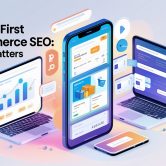Introduction: Why Ecommerce SEO Matters More Than Ever
The e-commerce industry is growing at a record pace. By 2025, global online retail sales are projected to surpass $7.4 trillion. That means more customers are shopping online—but it also means more competition than ever.
For online retailers, visibility is everything. Without strong search engine optimization (SEO), your products get buried beneath competitors, no matter how good they are. That’s why investing in professional ecommerce seo services is no longer optional—it’s essential.
This guide breaks down the strategies every store owner needs to rank in 2025, from technical optimization to content marketing and beyond. Whether you’re managing a Shopify store, a WooCommerce site, or a custom e-commerce platform, these tips will help you stay ahead.

Understanding Ecommerce SEO in 2025
E-commerce SEO focuses on optimizing product pages, categories, and site structure so search engines understand your offerings. Unlike general SEO, it requires a deeper focus on technical performance, conversion optimization, and large-scale content management.
Key elements include:
- Keyword research for products and categories.
- Site structure that’s easy for Google to crawl.
- High-quality product content optimized for users and search engines.
- Backlink strategies tailored to online retailers.
- Technical SEO to improve speed, mobile responsiveness, and schema.
Partnering with an ecommerce seo agency ensures that each of these moving parts works together to deliver visibility and sales.
Step 1: Keyword Research for Online Stores
Product discovery begins with search. Choosing the right keywords helps capture traffic from customers actively looking to buy.
Tactics for 2025:
- Product-Focused Keywords: Use long-tail queries like “best bamboo bed sheets Canada” instead of just “bed sheets.”
- Category-Level Keywords: Target broader searches like “affordable office chairs.”
- Voice Search Optimization: With voice search rising, optimize for questions like “Where can I buy eco-friendly sneakers online?”
- AI-Powered Tools: Leverage advanced keyword tools that predict trending searches in your industry.
Example: A Shopify brand targeting “vegan leather handbags” optimized product titles and meta descriptions with those terms, driving a 60% increase in organic sales.
Step 2: Optimizing Product Pages for SEO
Product pages are the lifeblood of online stores. Poorly optimized pages don’t just hurt rankings—they lose sales.
Elements of a high-performing product page:
- SEO-Friendly Titles: Include product name + key features.
- Unique Descriptions: Avoid manufacturer copy; write original, persuasive content.
- High-Quality Images: Use alt text with target keywords.
- Schema Markup: Add structured data for reviews, price, and availability.
- Internal Linking: Link to related products and categories.
Pro tip: Many businesses hire an ecommerce seo agency to scale product page optimization across hundreds or thousands of SKUs efficiently.
Step 3: Site Structure and Navigation
A clean site structure helps both users and search engines.
Best practices:
- Keep URLs short, descriptive, and keyword-rich (e.g., /mattresses/organic-latex).
- Organize categories logically—avoid deep hierarchies.
- Use breadcrumbs for easier navigation.
- Create an XML sitemap and submit to Google Search Console.
Example: An online electronics retailer reduced its category depth from 6 levels to 3, resulting in a 35% improvement in crawl efficiency and faster product indexing.
Step 4: Content Marketing for Ecommerce
Blogging may not seem essential for retailers, but content drives authority and rankings.
Strategies:
- Product Guides: “How to Choose the Right Mattress in 2025.”
- Comparison Posts: “Bamboo Sheets vs Cotton Sheets: Which Lasts Longer?”
- Seasonal Content: Gift guides, holiday specials, and trend reports.
- User-Generated Content: Showcase customer reviews, stories, or images.
Adding blogs and guides also creates opportunities for backlinks—critical for long-term rankings.
Step 5: Technical SEO Essentials for 2025
Technical SEO is often overlooked but directly impacts both rankings and conversions.
Key areas to address:
- Core Web Vitals: Google prioritizes speed, interactivity, and stability.
- Mobile Optimization: With 70% of e-commerce traffic coming from mobile, responsive design is mandatory.
- HTTPS Security: Protects customer data and improves trust signals.
- Crawlability: Use robots.txt and canonical tags to avoid duplicate content issues.
- AI-Powered Search Features: Prepare for generative AI search results by structuring product data effectively.
Example: An e-commerce retailer improved its mobile site speed by 40%, which boosted both Google rankings and conversion rates.
Step 6: Link Building for Online Stores
Backlinks remain a ranking factor, but for e-commerce, quality matters more than quantity.
Effective link-building tactics:
- Collaborate with Canadian influencers and bloggers.
- Secure mentions in industry publications.
- Use PR campaigns around product launches or sustainability initiatives.
- Create shareable content like infographics or shopping guides.
Partnering with professionals offering ecommerce seo services ensures backlinks are built ethically and strategically.
Step 7: Measuring Success and ROI
E-commerce SEO is measurable. Tracking the right KPIs helps you see whether your investment is paying off.
Key metrics:
- Organic traffic growth to product pages.
- Keyword rankings for product and category terms.
- Conversion rate from organic search.
- Revenue attributed to organic traffic.
- ROI compared to paid ads.
Pro tip: Work with an ecommerce seo agency that provides transparent reporting tied to sales—not just rankings.
The Future of SEO for Online Stores in 2025
E-commerce SEO continues to evolve. Businesses that adapt early gain a competitive edge.
Trends shaping 2025:
- AI Search Integration: Search results enhanced with AI summaries will highlight structured, optimized content.
- Visual Search: Consumers uploading photos to find similar products.
- Personalization: Search engines showing results tailored to user intent and shopping history.
- Sustainability Focus: Eco-friendly and ethical brands gaining more visibility.
Investing in seo for online stores now ensures your brand isn’t left behind as these shifts take hold.
Conclusion: Invest in Ecommerce SEO Services for Long-Term Growth
Ranking your online store in 2025 requires more than a few keyword tweaks—it demands a comprehensive strategy. From optimized product pages and technical SEO to link building and content marketing, every detail matters.
By leveraging professional ecommerce seo services, you can cut through the competition and capture more customers at the exact moment they’re ready to buy. Working with an experienced ecommerce seo agency gives you the expertise, tools, and scalability to turn organic traffic into consistent sales.
The future of e-commerce is competitive, but also full of opportunity. If you’re serious about growth, now is the time to double down on SEO and ensure your online store is built to rank—and win—in 2025 and beyond.




